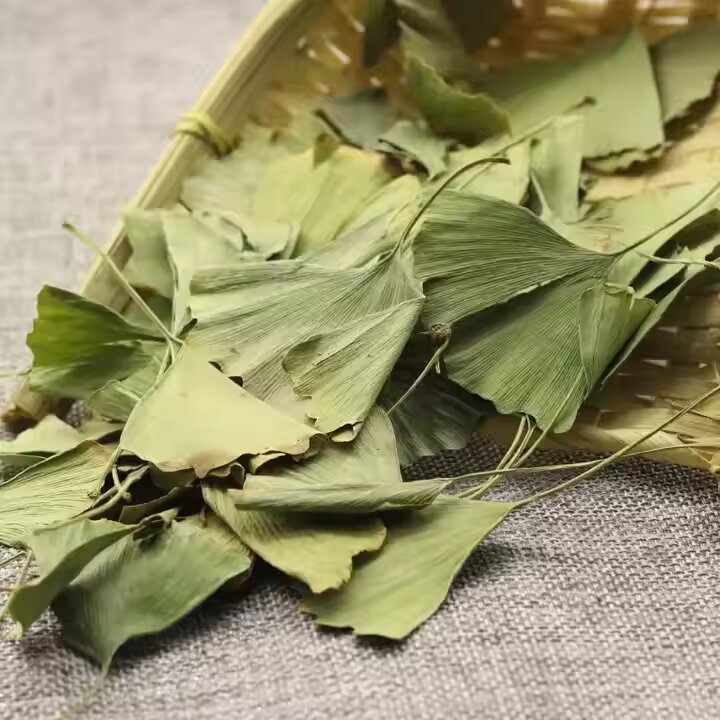INTRODUCTION
Ginkgo biloba is a large, deciduous tree known for its unique fan-shaped leaves and its resilience to environmental stresses. It is the only surviving member of the Ginkgoaceae family, which dates back over 200 million years, making it a “living fossil.” Ginkgo trees are widely used both as ornamental plants in urban areas due to their tolerance to pollution and as a source of herbal supplements believed to enhance cognitive function and improve blood circulation. The seeds of the ginkgo tree are enclosed in a fleshy, fruit-like covering that emits a strong odor when it decays.
Characteristics

- Appearance: Ginkgo trees are known for their fan-shaped leaves, which are often bright green in spring and summer, turning to a striking yellow in the fall. The trees can grow to be quite tall, sometimes reaching over 100 feet (30 meters).
- Lifespan: They are long-lived, with some specimens known to live for over a thousand years.
- Seed and Fruit: Female ginkgo trees produce seeds encased in a fleshy, fruit-like covering that has a strong, unpleasant odor when it decays. Male trees, which are preferred for ornamental planting, do not produce this fruit
Benefits
Ginkgo supplements are associated with several health claims and uses, most of which focus on brain function and blood circulation. Following mentioned below are some health benefits of ginkgo biloba:
Memory and thinking
Ginkgo is widely touted as a “brain herb”. It does help improve memory in people with dementia. It is not as clear whether ginkgo helps memory in healthy people who have normal, age-related memory loss. Some studies have found that ginkgo helps improve memory and thinking in young and middle-aged people who are healthy. It may be useful in the treatment of Attention Deficit Hyperactivity Disorder (ADHD). Ginkgo is often added to nutrition bars, soft drinks, and fruit smoothies to boost memory and enhance mental performance, although such small amounts probably do not help.

Anti-Inflammatory Effects
Ginkgo has been shown to have anti-inflammatory properties, which may help reduce inflammation in various parts of the body.
Heart health
In traditional Chinese medicine, ginkgo seeds were used to open “channels” of energy to different organ systems, including the kidneys, liver, brain, and lungs. Ginkgo’s apparent ability to increase blood flow to various parts of the body may be the origin of many of its supposed benefits.
Eye Health
Ginkgo may support eye health, particularly for conditions like glaucoma and age-related macular degeneration.
Reduced Symptoms of PMS (Premenstrual Syndrome)
Ginkgo biloba has been used to alleviate symptoms of PMS, including mood swings, headaches, and breast tenderness.
Dose

Ginkgo biloba is commercially available in the following forms:
- capsules
- tablets
- liquid extracts
- dried leaves/tea
Most of the current research reflects results used with purified ginkgo extract. Do not eat raw ginkgo seeds, as they are poisonous.
One of the limitations of the studies on ginkgo is that they did not use standardized dosing.
However, the bulk of the evidence seems to support the safety of taking 120–160 mg divided into several doses throughout the day.
There is no clearly defined maximum dosage, but it’s wise to start with a lower dose and work your way up to ensure tolerance.
Most research has not evaluated doses greater than 600 mg per day, so it’s probably not a good idea to exceed this amount.
Additionally, keep in mind that it can take several weeks before you begin to notice any effects.
Side Effects
Possible side effects of ginkgo biloba include:
- Nausea
- Diarrhea
- Dizziness
- Headaches
- Stomach ache
- Restlessness
- Vomiting
The ROASTED SEED or CRUDE GINKGO PLANT are possibly unsafe when taken by mouth. Eating more than 10 roasted seeds daily can cause serious side effects such as seizures. Eating FRESH SEEDS may lead to death. They are poisonous and considered dangerous.
This Article is for Basic Information. Contact a professional doctor before using it.
HAKEEM KARAMAT ULLAH
+923090560000




